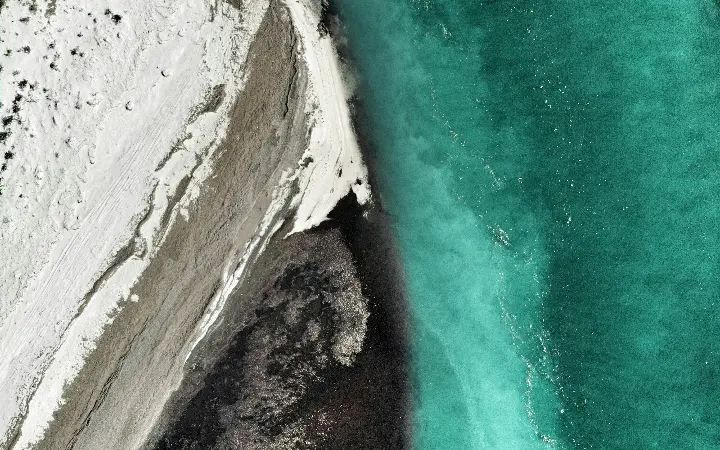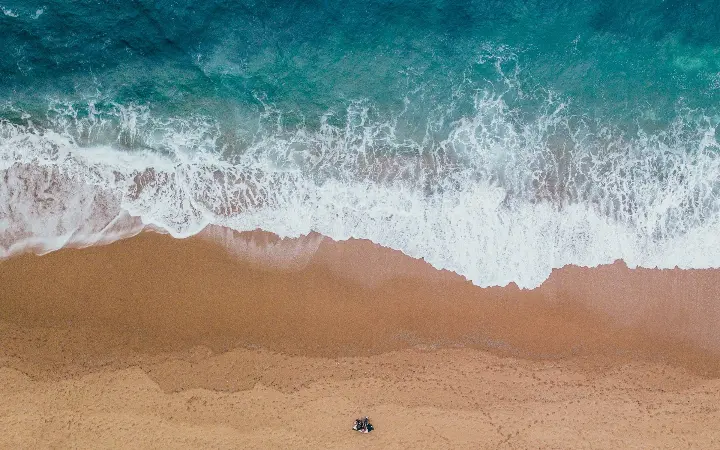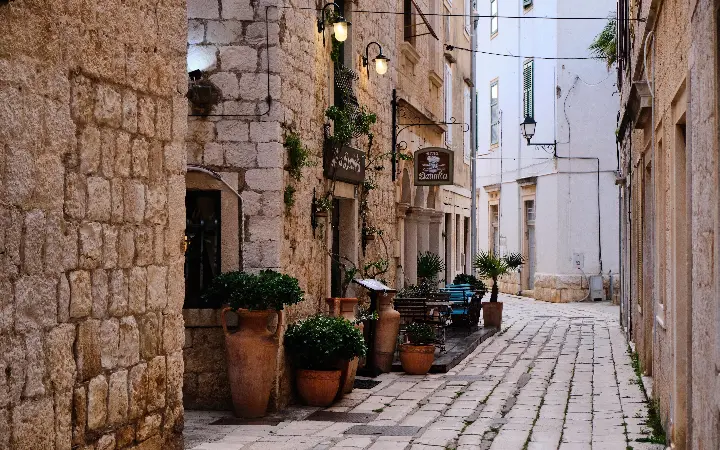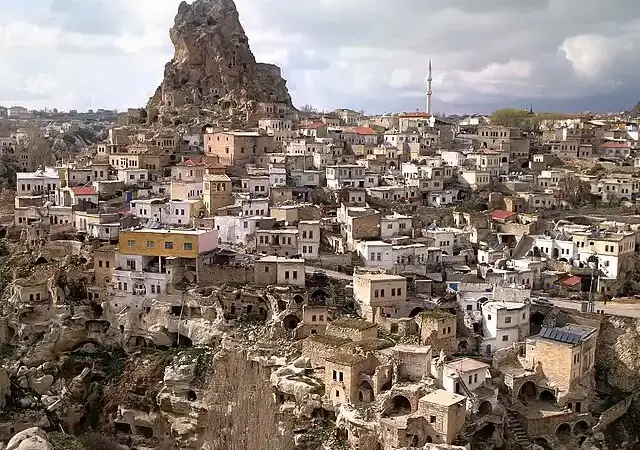Tranquility and Beauty in Djerba Island in Tunisia
Nestled in the sparkling waters of the Mediterranean Sea for thousands of years, the distinctive island of Djerba has been a jewel of Tunisia, captivating visitors with its pristine beaches, rich history, vibrant culture, and serene landscapes. Known as the "Island of Dreams," Djerba is the perfect getaway for those seeking relaxation, adventure, or a deeper connection with North Africa's fascinating heritage. Whether you want to relax on its sun-drenched beaches, explore its ancient ruins, or immerse yourself in its local culture and traditions, Djerba promises an unforgettable experience.

A glimpse into history: Djerba's legacy
The story of Djerba stretches back thousands of years, making it one of the oldest inhabited islands in the Mediterranean. Its strategic location along major trade routes attracted the Phoenicians, Romans, Byzantines, Arabs, and Ottomans, each of whom left their mark on the island's identity. Djerba is said to have been a stop for Odysseus during his epic journey in Homer's "Odyssey," adding a legendary charm to its ancient past.
Recommend
Under Arab rule, Djerba became a center of Islamic learning and spirituality. The Ghriba Synagogue, considered one of the oldest synagogues in the world, reflects the long-standing Jewish community and the island's religious diversity. Over time, Djerba evolved into a cultural melting pot that blends Berber, Arab, Andalusian, and Mediterranean influences. Today, the island stands as a testament to coexistence and harmony, with mosques, churches, and synagogues coexisting side by side.
Djerba... pure beaches and crystal clear waters
One of Djerba's greatest treasures is its stunning coastline, fringed by golden sands and turquoise waters. From busy tourist spots like Houmt Souk to secluded coves like Ras R'mel, the island caters to all types of beach lovers. Popular spots include:
- Sidi Mahrez Beach: Ideal for families, this beach offers calm waters ideal for swimming and sunbathing.
- Sidi Mansour Beach: Known for its stunning views and vibrant coral reefs, it's a favorite with divers and snorkelers.
- Sikia Beach: A quieter option, surrounded by lush greenery, offering a peaceful retreat away from the crowds.
Water sports enthusiasts will find plenty to enjoy, including jet skiing, kitesurfing, and paddleboarding. For those who prefer a quieter atmosphere, simply lying under the shade of palm trees and listening to the gentle lapping of the waves is an equally rewarding experience.

Cultural landmarks and historical sites
Djerba has a rich history, and its landmarks serve as gateways to the island's ancient past. Some must-see sites include:
1. El Ghriba Synagogue: Located in the village of Hara Kebira, this historic synagogue attracts pilgrims and visitors alike. The annual pilgrimage festival held during the Lag B'Omer period celebrates Jewish heritage through music, feasting, and ritual.
2. Borj El Kebir Fortress: Built by the Spanish in the 16th century, this fort played a pivotal role in defending the island against pirate attacks. Visitors can explore its walls and learn about its military significance.
3. Jelala Museum: Located in the city of Jelala, known for its ceramic production, this museum showcases traditional Tunisian crafts, including delicate ceramics, woven baskets, and jewelry. It also offers insights into the daily lives of Djerba's villagers.
4. Houmt Souk: The heart of the island, Houmt Souk is a vibrant market town filled with narrow alleyways, colorful souks, and historic mosques. Here, you can purchase hand-crafted carpets, spices, and silverware while immersing yourself in the authentic atmosphere.
5. Meninx Archaeological Site: Once a thriving Roman city, it features remains of ancient streets, theaters, and aqueducts. Guided tours provide fascinating insights into life during the Roman era.
Traditional villages and local life on the island of Djerba
Beyond the main attractions, Djerba's charm lies in its traditional villages, where time seems to have stopped. These rural communities preserve ancient traditions and the island's unique way of life. Some of the most famous are:
- Erriad Village: Known for its whitewashed houses adorned with blue doors and windows, Erriad exudes a serene atmosphere. Don't miss the Djerbahood Mural Art Project, which has transformed the village into an open-air art gallery featuring murals by international artists.
- Jellala: Known as the ceramics capital of Djerba, it's home to skilled artisans who craft beautiful ceramics using centuries-old techniques. Watching their work is a breathtaking experience.
- Midoun: As the island's second largest town, Midoun offers a glimpse into modern life on Djerba. Visit the weekly market to sample fresh produce, olives, and dates—an essential part of Tunisian cuisine.
Gourmet Food: Taste Tunisian Meals in Djerba
No trip to Djerba would be complete without enjoying its delicious cuisine. Influenced by Berber, Arabic, and Mediterranean flavors, Tunisian food is a feast for the senses. Start your day with "leblabi"*, a delicious chickpea stew flavored with garlic, cumin, and harissa, usually served with crusty bread. For lunch, enjoy couscous, often prepared with lamb, chicken, or fish along with seasonal vegetables. Seafood lovers will be delighted by the abundance of fresh fish and shellfish available at local restaurants. Try a spicy fish soup or stew, or grilled octopus marinated in lemon and olive oil. Desserts like baklava, makroud (date-stuffed semolina cakes), and assid zaytouna (a honey-flavored dessert) provide the perfect end to any meal. Pair these delicacies with a cup of mint tea or strong Turkish coffee for an authentic taste of Tunisia.

Natural beauty and outdoor adventures
Djerba's landscape is as diverse as it is stunning. In addition to its beaches, the island boasts salt flats, olive groves, and desert terrain that are just waiting to be explored.
- Sedouikh Salt Plains: These vast plains create magical and extraordinary views, especially at sunset when the sky turns shades of pink and orange. They're a photographer's paradise.
- Olive Groves: Scattered across the island, olive trees have been cultivated here for centuries. Take a guided tour to learn about olive oil production and sample some of the finest varieties.
- Desert Excursions: Head outside Djerba to nearby Matmata, known for its dug-in dwellings. You can also embark on a camel trek through the Sahel desert for a true Arabian Nights experience.
For wildlife enthusiasts, Djerba Explore Park is a must-visit. This eco-friendly destination combines a crocodile sanctuary, a bird sanctuary, and a museum dedicated to African art and culture.
Festivals and celebrations
Djerba comes alive throughout the year with festivals celebrating cultural diversity and artistic spirit. Highlights include:
- Pilgrimage of La Ba'omer: Thousands gather at the Ghriba Synagogue to honor Jewish traditions, creating a living tapestry of faith and unity.
- Djerba International Film Festival: Showcasing films from around the world, promoting intercultural dialogue and cinematic excellence.
- Local Weddings and Harvest Festivals: Attending these celebrations offers a glimpse into authentic Tunisian traditions, with music, dance, and feasting.

Why visit Djerba?
.Djerba isn't just a tropical paradise; it's a destination that engages all your senses. Its blend of history, culture, and natural beauty guarantees something for everyone—from history buffs and nature lovers to foodies and adventurers. The warm hospitality and casual atmosphere make it easy to feel at home, even if you're far from home. Whether you're admiring the intricate mosaics of ancient ruins, wandering through bustling souks, or simply relaxing on a sun-drenched beach, Djerba leaves a lasting impression on every visitor. Its timeless appeal and unique character make it a destination unlike any other.
Plan your trip to Djerba
To get the most out of your trip to Djerba, plan carefully based on your interests. Spring (March to May) and fall (September to November) are the best times to visit, as the weather is mild and beautiful. Accommodation options range from luxurious resorts in the tourist area to charming guesthouses in traditional villages, catering to all preferences.
Getting to Djerba is convenient, accessible via Djerba-Zarzis International Airport or by car from mainland Tunisia. Public transportation, taxis, and car rentals are readily available for exploring the island. Guided tours are highly recommended for first-time visitors, as they provide valuable insights into the historical and cultural context of each location.
So, pack your bags and embark on a journey to Djerba—an island where history whispers through ancient stones, and the Mediterranean breeze carries the stories of past empires. Your adventure awaits!
![]()
How to learn any language in a short time? 8 practical tips
There’s no quick fix for learning a language, but with steady effort and the right methods—like setting goals, practicing daily, or using apps like Duolingo—you’ll improve with time. Surround yourself with the language and focus on real-life use rather than just grammar. more- ADVERTISEMENT
![]()
3 rarer stones than diamonds
Diamonds are prized for their beauty, hardness, and rarity, but some gemstones are even rarer. Tanzanite, found only in Tanzania near Mount Kilimanjaro, is highly valued for its deep purple-blue hue and tough mining conditions. Burmese ruby and Sri Lankan sapphire also stand out for their unique color and scarcity. more- ADVERTISEMENT
![]()
The Unity Economy: How Isolation Changes Our Buying Habits
Loneliness is becoming a social epidemic, affecting both young and old. Despite being more connected than ever, people feel increasingly isolated, often turning to consumerism for comfort—buying entertainment, luxury, or even companionship. Brands must respond by offering personalization and building communities that help people feel seen and included. more- ADVERTISEMENT
![]()
Jobs that will disappear and others that are needed due to artificial intelligence
AI is evolving fast, replacing many jobs that involve routine tasks like data entry, customer service, and even accounting. But instead of fear, this shift brings new opportunities in fields like AI development, cybersecurity, and creative innovation—where human skills in critical thinking and empathy are more needed than ever. more- ADVERTISEMENT
![]()
Turkey: The country that heals hearts and steals souls
From Istanbul’s magic to Cappadocia’s dreamy skies, Turkey stirs the soul with ancient wonders, warm-hearted people, and unforgettable beauty. More than a destination, it's a journey through time and emotion that stays with you long after you’ve gone. more- ADVERTISEMENT
![]()
Learn how to learn: strategies to acquire difficult skills
Learning new skills is key to success today, but it’s not easy. Using practical strategies like learning by doing, setting clear goals, and using online tools can help. Overcoming frustration and staying motivated are also important for progress and creativity. more- ADVERTISEMENT
![]()
Polar bears and climate change: the threatened future of Arctic icons
Polar bears, majestic symbols of the Arctic, face a deeply troubling future as climate change melts their icy habitat, disrupts their food sources, and puts pregnant females at greater risk. With shrinking ice and rising temperatures, their survival grows harder, making urgent global action vital to protect these stunning creatures. more- ADVERTISEMENT
![]()
The Enigmatic Universe: 8 Astonishing Facts about Space and Time
Black holes might be gateways to parallel worlds, and time itself could possibly be reversed—just theories for now, but thrilling ones that stir curiosity. Dark energy and matter, though unseen, dominate our universe. And yes, UFOs still spark debate. The cosmos remains full of mysteries waiting to unfold. more- ADVERTISEMENT
![]()
Alhambra Tower. The tallest skyscraper in Kuwait
The Al Hamra Tower in Kuwait City stands 414 meters tall with a unique design inspired by Arabian robes. Opened in 2011, it offers stunning Gulf views, reflects differently from every angle, and showcases Kuwait's modern engineering brilliance and ambition. more- ADVERTISEMENT
![]()
Can you really master a skill by learning for one hour a day?
Can You Really Master a Skill by Learning for One Hour a Day? more- ADVERTISEMENT





















